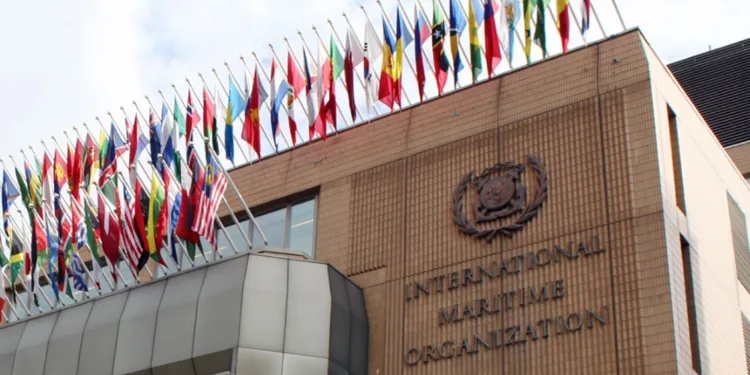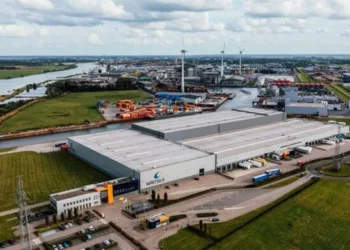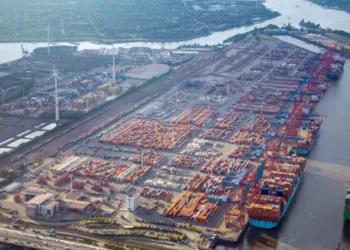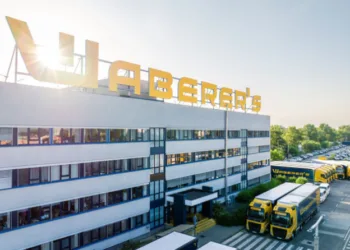Emma Fenton, senior director of global diplomacy at Opportunity Green, explains the significance of the IMO Net-Zero Framework.
If you had to pick just one sentiment to describe the London International Shipping Week, it’s the anticipation of something great – and long-overdue – finally happening.
The week started with a powerful endorsement from over 180 global shipping companies for the historic shipping climate regulation, the IMO Net-Zero Framework, the world’s first meaningful emission pricing system on any international polluter.
The IMO’s agreed, legally-binding mechanism will require shipping companies to gradually reduce the carbon intensity of the energy they use on ships in line with set targets, and pay penalty fees if they fail to do so. It’s also expected to generate $10-15bn a year from 2030.
Ships are a major facilitator of global trade, but their reliance on fossil fuels means that they produce more emissions than most individual countries worldwide.
The Net-Zero Framework is unique, because at a time of great geopolitical strain, it provides much-needed proof that multilateralism can still deliver climate action. It also signals clearly to the industry that the age of fossil-fuelled shipping is coming to an end.
But nothing is perfect and there’s still important work to be done to get the framework into the shape that the industry, vulnerable countries and the climate desperately need it to be.
Critical policy details on revenue spending and energy pathways need to be clarified in the framework’s guidelines between now and 2027, when the mechanism enters into force. These details will determine whether shipping will maintain its leadership as a true climate and equity champion, powered by renewable energy and helping to drive the green energy revolution in developing countries, or whether it will prop up false, higher-emission fuels and technologies, stalling the transition and leaving climate vulnerable countries behind.
First of all, the IMO has the opportunity – and a duty – to address the inequity that is deeply rooted in the shipping industry, by ensuring a fair and equitable distribution of the revenues collected in the IMO fund.
The revenues from this fund will be critical to support countries at the frontline of climate change with maritime upgrades to zero-emission, which will require investments in ports, fleets, seafarers training and resilience of supply chains as well as finance for adaptation and resilience.
But the positive impact of the revenues can go even further.
The fund could provide the financial guarantees for green industry projects in developing countries that have bountiful renewable energy sources and are best positioned to be our future renewable energy hubs, supplying green hydrogen, green ammonia and other e-fuels for domestic purposes but also to power shipping.
E-fuels are essential for shipping to achieve its long-term climate targets, and the growing demand for this energy would help unlock jobs and growth across Africa and South America. This would not only help improve people’s lives and prosperity, but also ensure production ramps up for shipping’s zero-emission energy transition.
But making this happen will also require the IMO to provide clear incentives and rewards in the framework for the uptake of e-fuels.
Energy producers and shipowners have been calling for e-fuels incentives for years, to provide market certainty to scale up investments. If the IMO fails to deliver now, e-fuels would have to compete with cheaper but unsustainable dead-end solutions, like fossil gas (LNG) and biofuels, up until 2040, with many countries missing out on the economic growth that would be delivered through the uptake of e-fuels.
Expanding shipping into unsustainable feedstock biofuels has also been of particular concern to clean transport and nature conservation groups who are calling on the IMO to close the door for this type of fuel altogether, due to its serious environmental and climate impacts.
They argue the best way the IMO can avert environmental disaster caused by feedstock biofuels is by considering the full lifecycle of emissions from energy use on ships in the Life Cycle Assessment (LCA) guidelines. This includes Indirect Land Use Change (ILUC), e.g. the impacts on land, which would provide the full clear picture of what impact different energy sources may have.
The IMO Net-Zero Framework is a promising start, with a clear majority of countries at the IMO and the maritime industry firmly behind it. But it needs a strong design to live up to its fullest potential as an accelerator of the clean transition, and as a driver of growth and prosperity in developing countries.
As governments meet in London again in October to formally adopt the Framework and kick-off crucial discussions about the guidelines, we need countries to show commitment to what they started and make the Net-Zero Framework a true beacon of global cooperation, solidarity and climate action.




















